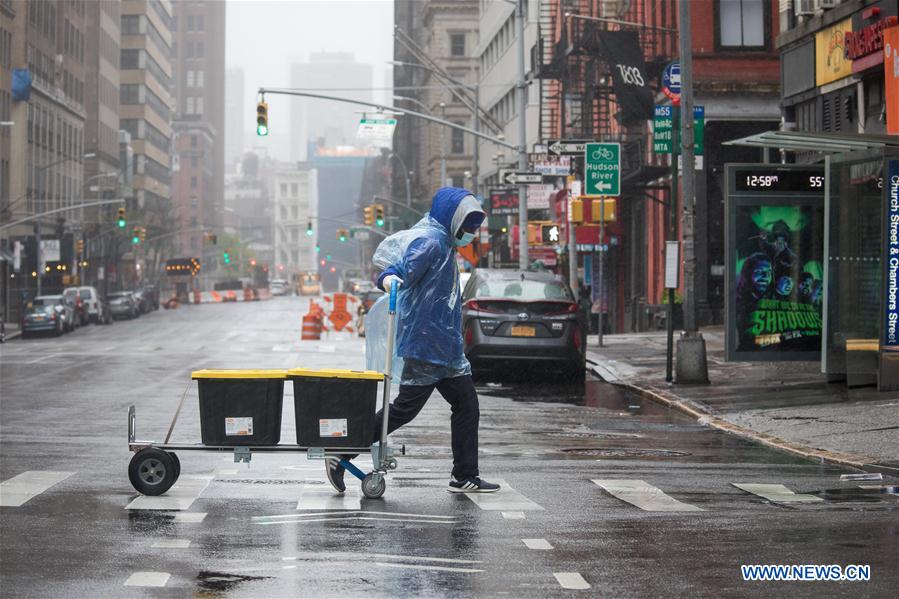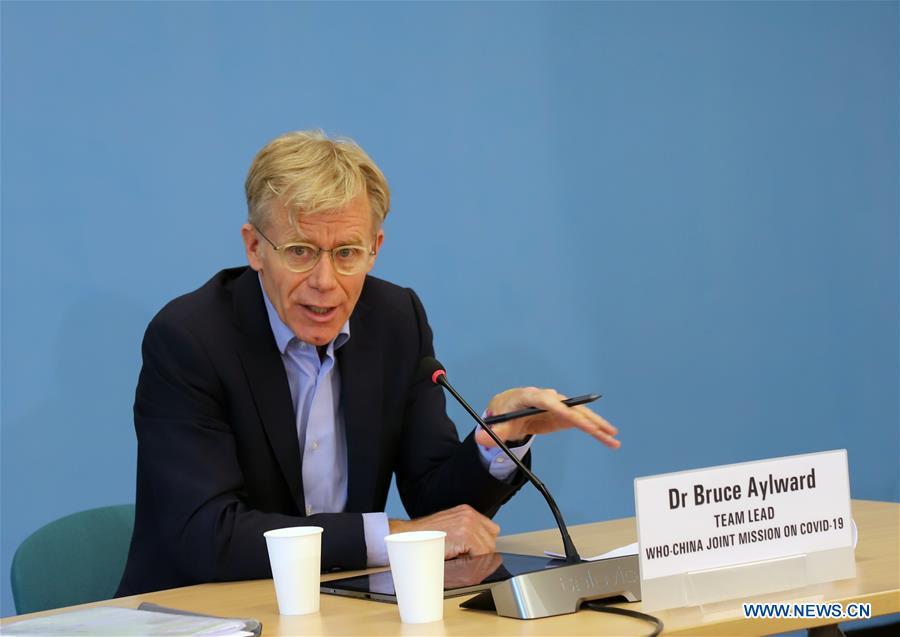


A worker wearing a mask delivers packages during the COVID-19 pandemic in New York, the United States, April 13, 2020. (Photo by Michael Nagle/Xinhua)
Months after she was spat on and verbally harassed by a stranger in San Francisco in March 2020, 26-year-old Zhu Yuanyuan is still haunted by fear. Living in the U.S. for five years, being blamed for the COVID-19 might be the last thing she would have ever expected.
“The man shouted at me and yelled an expletive about China. When a bus passed, he screamed after it, saying run ‘them over’,” Zhu told the New York Times.
For the rest of 2020, countless misleading news regarding COVID-19, as well as irresponsible remarks from public figures, have made Asian-Americans like Zhu realize who the real culprit was behind their suffering. They were infuriated to see that the then US President Donald Trump labeled COVID-19 as the “Chinese virus,” while Fox News, a cable news television channel in the U.S., spread rumors such as the “coronavirus outbreak was created in a lab in Wuhan” and “China has blood on their hands for their role in the pandemic,” ignoring objections from the World Health Organization and prestigious medical journals such as The Lancet, a prominent British medical journal.
The neo-obscurantism taking shape

Former US President Donald Trump’s “China virus” rhetoric has been condemned by experts and members of the public for inciting xenophobic crimes across the country, as well as spreading false information of the COVID-19 pandemic. (Xinhua /Liu Jie)
“The idea that whatever China does must be wrong is especially troubling, considering the fact that their tactics appear to have gotten to grips with the pandemic. First of scoring partisan points and then of finding a scapegoat to blame, the press are ignoring their role as providers of information and refusing to learn the lessons of what techniques work in controlling a pandemic,” FAIR, a New York-based media critique organization, noted in its 2020 report.
Zhang Weiwei, a professor and director of the China Institute of Fudan University in Shanghai, noted that by feeding the world biased information, the Western world has entered an era of “neo-obscurantism”.
“The Enlightenment of Europe replaced obscurantism with rationalism, leading to a great progress in human history. But in modern era, the Western world pushed their discourse system, as well as its political and economic mode to extremes, leading to what I call neo-obscurantism,” said Zhang.
“Neo-obscurantism is a mixed product of biased Western ideology, misguided social sciences and very parochial culture. It makes the West misunderstand China, as well as fail to understand their own problems,” Zhang added.
According to a survey conducted by Pew Research Center in April 2020, around 61 percent Americans said they were following news about the coronavirus outbreak at both the national and local level. News media is a major source of COVID-19 information for the Americans.
Instead of feeding the public authentic information and scientific anti-pandemic measures, some Western media seized the opportunity to situate their news stories in the context of Sino-Western tensions, defining the pandemic as Chinese, ignoring facts and professional suggestions from international science communities.
The Daily Telegraph, an Australian tabloid newspaper, published a fabricated report in May, saying that its journalist Sharri Markson obtained a 15-page research document from the Five Eyes intelligence agencies, naming the Wuhan Institute of Virology as the origin of COVID-19. The false claim was soon denied by intelligence agencies from both the US and Australia, while senior officials in Australia’s intelligence community told the Sydney Morning Herald on May 4 that The Daily Telegraph’s so-called secret dossier was based on news reports without any intelligence information.
But the damage was done. The unethical report was widely quoted by Western media, and Markson was even invited to spread her lies on Fox News, feeding the public false information. Many public figures like Markson, including US congressman Michael McCaul and former State Secretary Mike Pompeo, laid blame for the severity of COVID-19 on China and the WHO, raising conspiracy theories without solid evidence against China.
Such biased reports and remarks have contributed to the rise of the world’s discontent over and misunderstanding of China. According to Pew’s survey in 2020, 73 percent of U.S. adults say they have an unfavorable view of China, up 26 percentage points since 2018.

Bruce Aylward, an epidemiologist who led an advance team from the World Health Organization (WHO), speaks at a press briefing at WHO headquarters in Geneva, Switzerland, Feb. 25, 2020. (Xinhua/Chen Junxia)
By contrast with those media reports, medical professionals have expressed totally different opinions on China’s endeavor to curb the spread of COVID-19. Bruce Aylward, a Canadian epidemiologist and leader of WHO-China Joint Mission on Coronavirus Disease 2019, noted in his teams’ report that China has changed the course of a rapidly escalating outbreak through ambitious, agile and aggressive containment efforts, while Richard Horton, editor-in-chief of The Lancet, said China’s reaction is decisive and quick, including the decision on the lockdown of Wuhan.
“There is an American saying: ‘The system works.’ However, if the Chinese system works, it’s not news in the West…In my line of work, only bad news is real news, and good news is no news. This is especially so when it comes to reporting on China.” Alex Lo, writer of South China Morning Post, noted in his column.
Dwindling credibility and severe consequences

According to statistics from Pew, 52 percent of Americans say they now have either not too much or no confidence at all in journalists to act in the best interest of the public, a number that has dropped slightly since 2018. (Photo by Pixabay)
Misinformation and irresponsible remarks from Western media and public figures have led to severe consequences.
“Refusing to wear masks, savage riots at the U.S. Capitol all pointed out that the West is bearing the consequences. Biased reports have already caused damage to Western nations’ governance, as public opinions can influence the government’s policies and decisions.” said Cao Peixin, a professor at the Communication University of China.
“Many Western citizens have now retreated into information cocoons of like-minded media sources, only accepting negative views about China. Media has blurred their judgement, making them self-centered and ignorant of the modern world,” Cao added.
When Harvard scholar Cass R. Sunstein created the term “information cocoon” in 2006, he stressed that people love reading things that fortify and confirm their own opinions, in which people enter information cocoons.
Biased reports and remarks regarding China from Western media and public figures have now accelerated the speed of people’s retreating into information cocoons filled with lies about China. Many Western citizens now only believe things that are false, failing to learn countless things that are true.
But as the COVID-19 pandemic has now been under control in China and the nation became the only major economy to record positive growth in 2020, some Western media had to accept the fact that the information they were spreading were proven false, with their credibility dwindling swiftly.
According to statistics from Pew, 52 percent of Americans say they now have not too much or no confidence at all in journalists to act in the best interests of the public, a number that has dropped slightly since 2018, while 56 percent of Americans think journalists have “low” or “very low” ethical standards.
“China’s economy is recovering much better than any nation in the world, and the life of its people are now almost back to normal. That is totally different from what I’ve read in the newspaper,” Ola Anderson, a 26-year-old Norwegian student told People’s Daily Online.
“By telling lies about China, media outlets’ credibility is dwindling. I would like to see more stories from the Chinese perspective, it may offer me a more balanced view,” said Ola, who added that nowadays new media in Norway deliver many factual reports about China’s achievement in combating the COVID-19 pandemic.
“[Misinformation of China] results in intellectual disadvantages for citizens in the West by preventing them from having a proper picture or perspective on a country they have been told is the greatest threat to freedom, democracy and world peace,” said Alex Lo.

 Award-winning photos show poverty reduction achievements in NE China's Jilin province
Award-winning photos show poverty reduction achievements in NE China's Jilin province People dance to greet advent of New Year in Ameiqituo Town, Guizhou
People dance to greet advent of New Year in Ameiqituo Town, Guizhou Fire brigade in Shanghai holds group wedding
Fire brigade in Shanghai holds group wedding Tourists enjoy ice sculptures in Datan Town, north China
Tourists enjoy ice sculptures in Datan Town, north China Sunset scenery of Dayan Pagoda in Xi'an
Sunset scenery of Dayan Pagoda in Xi'an Tourists have fun at scenic spot in Nanlong Town, NW China
Tourists have fun at scenic spot in Nanlong Town, NW China Harbin attracts tourists by making best use of ice in winter
Harbin attracts tourists by making best use of ice in winter In pics: FIS Alpine Ski Women's World Cup Slalom
In pics: FIS Alpine Ski Women's World Cup Slalom Black-necked cranes rest at reservoir in Lhunzhub County, Lhasa
Black-necked cranes rest at reservoir in Lhunzhub County, Lhasa China's FAST telescope will be available to foreign scientists in April
China's FAST telescope will be available to foreign scientists in April